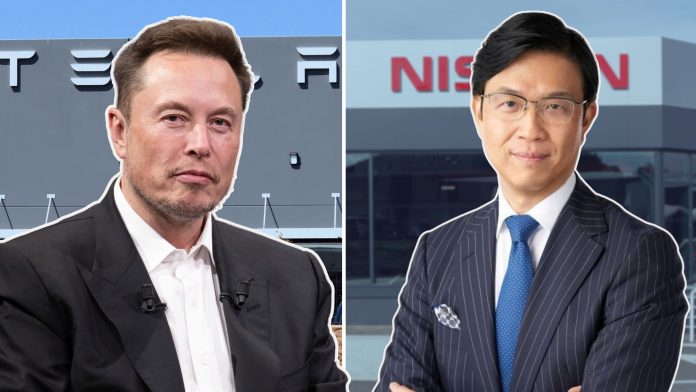Yesterday, the British-based Financial Times reported that a high-level Japanese group had drawn up plans for Elon Musk’s Tesla to invest in the struggling Japanese automaker Nissan. The rumored proposal suggested that Tesla would invest in Nissan in exchange for the company’s U.S.-based facilities. Acquiring Nissan’s plants could help Tesla ramp up domestic manufacturing, especially as President Donald Trump looks to impose tariffs on imported vehicles. Meanwhile, Nissan would benefit from much-needed financial support, helping to mitigate its devastatingly low sales and effectively cut its global production.
After the news broke, Nissan’s shares spiked, rallying as much as 12%, before closing up 9.5%. This marked the highest level for Nissan’s stock since January when merger talks with larger rival Honda began.
Those talks, which involved a proposed $60 billion merger that would have made the two automakers the third-largest auto group in the world by sales volume, were ultimately terminated amid clashes over leadership. Honda proposed turning Nissan into a subsidiary, but Nissan rejected the offer, steadfast in its desire to retain independence.
Despite this, Nissan’s ongoing financial struggles highlight the company’s urgent need for a strategic partner or investor to help stabilize its position and support its operations.
The Financial Times reported that the investment proposal was led by former Tesla board member Hiro Mizuno. In a swift response on X, Mizuno denied the claims, stating that he “has absolutely no involvement” in such a group and expressing doubt that Tesla would be interested in acquiring Nissan’s plants.
Tesla CEO Elon Musk also chimed in on X, dismissing the reports. Like Mizuno, Musk emphasized that Tesla’s factory design is unique and unlike anything other automakers have. His company’s manufacturing process is a key competitive advantage, and taking over Nissan’s plants wouldn’t offer Tesla significant value. If Tesla were to acquire Nissan’s plants, it would face the difficult task of retrofitting the facilities to accommodate its specialized manufacturing processes, which could prove more costly than simply building new factories from the ground up.
With both Musk and Mizuno refuting the proposal, Nissan now finds itself facing an uncertain future. It’s becoming increasingly clear that the automaker will need a partner to survive in the current market. But it is equally committed to maintaining its independence, creating a challenging balancing act. Desperately needing external support while fiercely holding onto its autonomy, Nissan appears to be at a crossroads.





